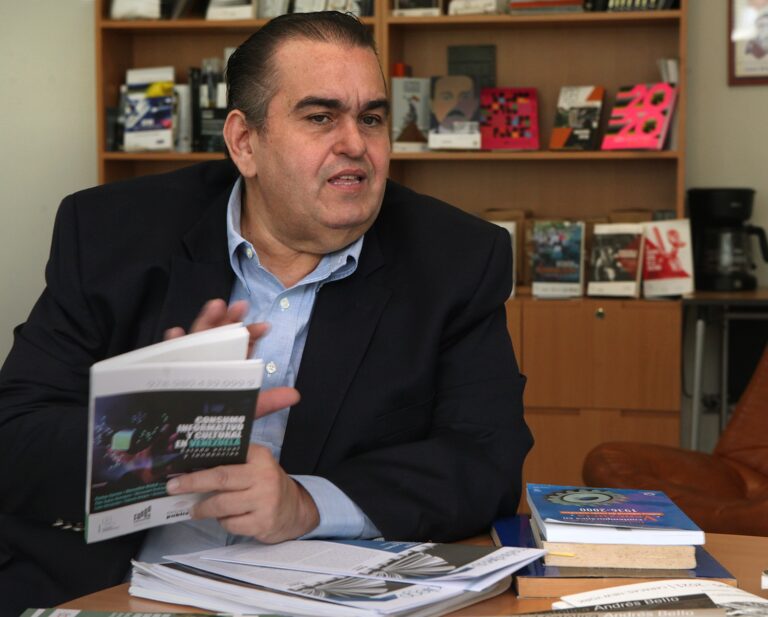The Scientific, Penal and Criminalistic Research Corps has attempted to implicate journalist Juan José Farías with charges for allegedly instigating crime and associating with criminals, for the publication of several pieces on an event that happened in Maracaibo.
(IPYS-Venezuela/IFEX) – On January 30, 2013, the Zulia state delegation of the Scientific, Penal and Criminalistic Research Corps (CICPC for its name in Spanish) -part of the ministry of the interior and justice- opened a case against Juan José Farías, correspondent of IPYS-Venezuela in the state, and the events reporter for La Verdad, a private newspaper that is distributed in that region. This body attempted to implicate the journalist with charges for allegedly instigating crime, associating with criminals, and generating gloom and doom, for the publication of several pieces on an event that happened in Maracaibo.
The event
Farías told IPYS-Venezuela that the media he works for published several stories on the murder of Miguel Ángel Boscán Alba, a.k.a the “Pepillo”, who had also been a pran (a type of prison leader who is also incarcerated) in the National Prison of Maracaibo, where he finished a sentence of 14 years. It is presumed that Boscán’s death occurred during a confrontation between criminal bands that he supposedly belonged to and state police officers. This apparently resulted in the deaths of two Zulia police officers, and this sparked a violent dispute between jail leaders and security officials.
According to the sources consulted by the paper, money was offered from the jail for the murder of the police officers linked to Boscán’s murder. When he heard of this, the response of the head of the CICPC in Zulia, Luis Monroy, was to offer a cash reward to police officers if they assassinated the alleged delinquents. This information was offered during a telephone interview with Farías, and was later ratified at a press conference with the region’s media. Later on, the governor of Zulia state, Francisco Arias Cárdenas, rejected this situation and announced that the police corps of Zulia state would be absorbed by the Bolivarian national police corps, an entity that is ascribed to the national government.
Farías said that on Monday January 28, 2013, a citation issued by the CICPC arrived at the newspaper’s headquarters, but the motive for the summons was not indicated. “I heard that Luis Monroy had been transferred to San Cristóbal (Táchira state)”, presumably due to comments he had made about the Maracaibo incident, “so I assumed that it was about a story I had published with his statement”.
The following day, Farías attended the summons by the CICPC homicide investigations division. “I was led into the office of the supervisor, where there were a legal adviser and another woman. The two ladies were trying to intimidate me”, the journalist said. “They said that what I had done was very serious, that they could investigate me for instigating crime and associating with criminals. They accused me of instigating a massacre among delinquents and cops”, he said. Only then did the journalist make the connection between the accusations and what he had published on the death of Boscán and the police officers.
“They told me they wanted to know -although they knew that as journalists we are not obligated to reveal our sources- what was the origin of the threat towards the policemen. I explained to them that somebody had called the newspaper, he identified himself as an inmate from the national jail in Maracaibo, and alerted me to the disputes with the police. But I never, at any time, had any contact with the inmates of that jail and do not have any as sources of information”.
According to the testimony given by Farías, among the persons that corroborated the information were “the head of the CICPC delegation, Luis Monroy and Jairo Ramírez, secretary of security of Zulia state”.
Then, the legal adviser asked to talk to Juan José Farías in private. “She explained to me that after the article, all the policemen hid their badges, ripped off the stickers from their cars and only left their homes to go to their jobs. Immediately after, they took me into a cubicle with an agent sitting in front of a computer. He asked for my identity card, telephone number, home address and the name of my parents. He asked where I got the information from, who had authorized its publication, and if I had any contact with any prisoners. I answered more than 15 questions. I don’t remember all of them- but one of them was whether the newspaper La Verdad had suffered any attack last year, when the alleged leaders of the penitentiary center shot at and threw grenades at the headquarters of the dailies Qué Pasa, Versión Final and El Regional del Zulia and Catatumbo TV channel”.
Farías arrived at the headquarters of the CICPC at 9:00 a.m. and the interview ended at 1:00 p.m. A summons for Farías’ bosses at La Verdad was requested, for having authorized the publication of the stories on the Boscán case.
According toFarías, a legal advisor of the newspaper La Verdad contacted an attorney of the justice department of Zulia state and verified that this judicial entity did not order the CICPC procedure.
The Instituto Prensa y Sociedad de Venezuela exhorts the public authorities and especially the security corps of Zulia state, to guarantee the necessary conditions for Juan José Farías to be able to do his work as a journalist without being subjected to intimidation and threats that could jeopardize his work and physical integrity.


